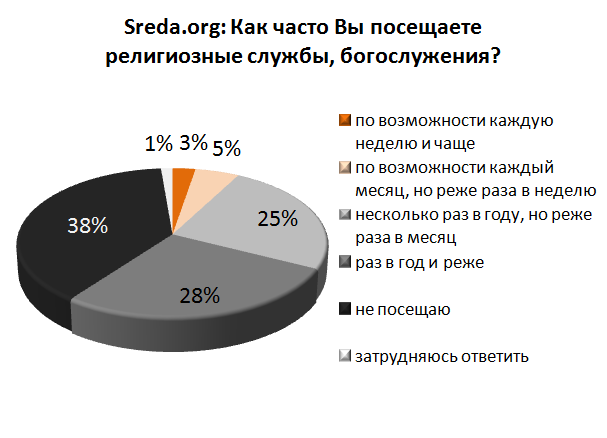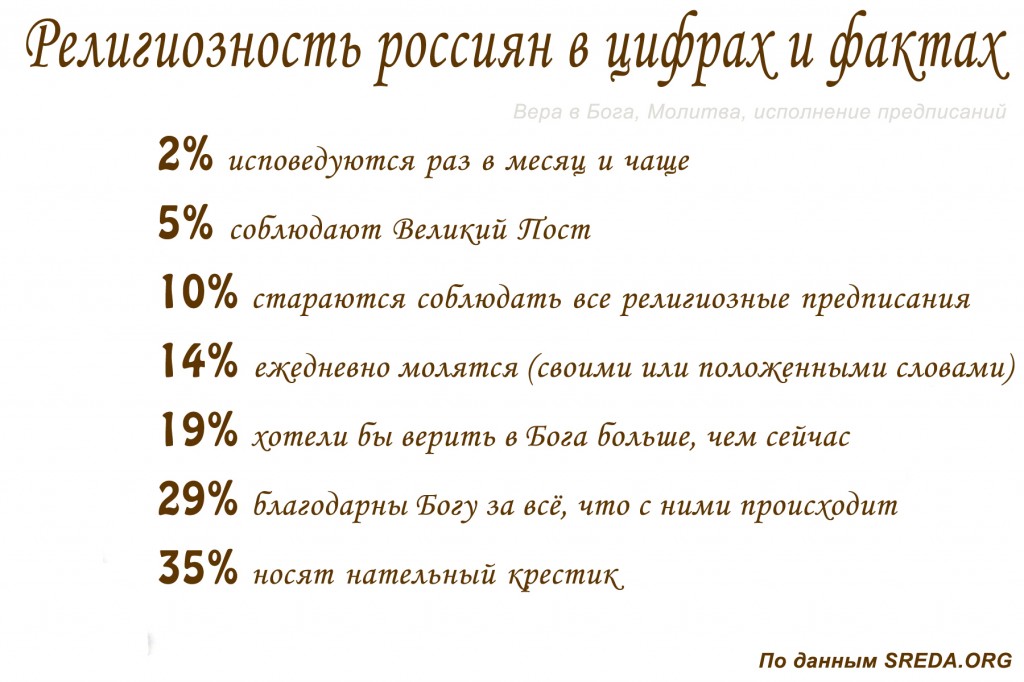Visiting services, fasting, wearing a cross, and praying
08/23/2012Most Russians attend services several times a year or less – according to national survey data..
3% of Russians attend religious services once a week or more, the most popular answer – “do not visit”, it was selected by 38% of the respondents.
Orthodox respondents, who belong to the Russian Orthodox Church, mainly attend services several times a year – 40% of believers. 3% visit services in a church weekly – the same number as the Russians on average. 15% of the Orthodox said that they do not attend services at all, and 69% of Muslims said the same. Even 4% of non-believers attend services once a year or less.
Church services are more often visited by women: 31% are involved in the services several times a year, compared to 16% among men. 49% of men do not attend religious services at all, the same do 30% of women.
Half of the Russians with less than secondary education do not attend services, so do a third of those with a diploma. Rural residents are also more likely not to participate in religious services (among them, 44% do not visit church services). The same is with workers (46%), residents of the Siberian Federal District (46%), Russians with the lowest income (49%) , Vladimir Zhirinovsky voters (51%), and those who do not trust the church (57%) or the Patriarch (58%). However, the most indifferent to religious services are the people living in the Far East. 70% of the residents of the Federal District never attend services.
Those who are slightly more likely than the average for Russia (5%), to attend services every month are residents of the Central Federal District (8%), those involved in charity work (9%), the Orthodox (10%), Muscovites (13%), those who trust the Church (14%), and Sergei Mironov voters (16%). Those who wear a cross and observe Lent, also attended services on a monthly basis more frequently than the average for Russia – 11% and 21%, respectively.
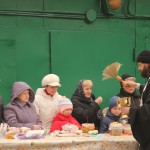 2% of Russians confess once a month or more.
2% of Russians confess once a month or more.
Basically, these are the same people who observe Lent, and attend religious services.
5% of Russians observe Lent.
Women fast twice as often as men.
Among young people 1% fast, and among elderly respondents – 8%.
Lent is observed by one out of ten Russians who consider themselves Orthodox.
10% of respondents are trying to keep all religious rules
Women try to observe religious precepts twice as often as men.
Older Russians are three times more likely to observe religious prescriptions than young people.
Parents of two or more children more often observe regulations than childless respondents
The Northwest Federal District has the lowest proportion of fasting and observing precepts.
14% Orthodox Christians try to follow all the requirements of the faith.
Among the supporters of Zyuganov and Mironov, 16% and 22% of respondents, respectively, follow religious regulations.
 Those who trust the Church are two times more likely than the average Russian to comply with all regulations.
Those who trust the Church are two times more likely than the average Russian to comply with all regulations.
Among donators, the percentage of those following religious precepts is also twice more than the national average.
14% of Russians pray every day. Those who pray every day are…
6% of men and 20% of women;
7% of Russians under 24, and 24% of Russians older than 65 years;
7% of workers and 24% of those working in the sphere of education;
8% of childless Russians and 16% of Russians who have two children;
19% of the population of the Central Federal District, and 4% of the population of the Far Eastern Federal District;
19% of Orthodox and 10% of those who believe in God but do not belong to any religion;
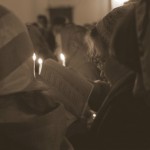 1% of the voters for Vladimir Zhirinovsky and 20% of voters for Gennady Zyuganov;
1% of the voters for Vladimir Zhirinovsky and 20% of voters for Gennady Zyuganov;
21% of those who trust the Church, and 6% of those who do not trust the Patriarch;
15% of Russians who consider themselves happy, 22% of who called themselves sick, and 27% of who called themselves lonely;
34% of those engaged in charity;
45% of those who observe Lent;
and 19% of Russians who are superstitious.
19% would like to believe in God more than they do now. Those who would like to increase their faith in God are….
14% of men and 23% of women;
13% of respondents with the lowest income, and 30% of respondents with the highest;
9% of the population of the South and the North Caucasus Federal District, and 30% of the residents of the Urals Federal District;
 3% of non-believers, 8% of Muslims, 23% of those who believe in God but do not belong to any religion, and 24% of the Orthodox.
3% of non-believers, 8% of Muslims, 23% of those who believe in God but do not belong to any religion, and 24% of the Orthodox.
29% of Russians are grateful to God for everything that happens to them……
22% of men and 35% of women;
21% of workers and 56% of managers;
14% of residents of the Far East and 30% of the residents of the Central Federal District;
3% of non-believers and 35% of the Orthodox;
22% of those who do not trust Patriarch Kirill and 43% of those who have started to trust the Russian Orthodox Church more than earlier;
39% of happy people;
46% of those who wear a cross, 58% of who are engaged in charity, and 59% of those who observe Lent.
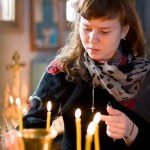 35% of Russians wear a cross. Who wears a cross among Russians?
35% of Russians wear a cross. Who wears a cross among Russians?
29% of men and 41% of women;
30% of workers and 41% of non-working pensioners;
50% of respondents with the highest income;
19% of residents of the Far East and 40% of the residents of the Central Federal District;
3% of non-believers and 48% of the Orthodox;
23% of those who do not trust Patriarch Kirill;
52% of whose trust to the Church has increased
Photo (c) Tatiana Grudina, Eugene Vishnev, Svetlana Gruzdeva, Nikita Louth, Oles Studzenek, Tatiana Zubova
The material is based on the results of a national survey, in which the Russians were asked to express their agreement or disagreement with the following statements:
1. I would like to believe in God more than I believe now
2. I thank God for everything that happens to me
3. I pray almost every day
4. I wear a cross
5. I try to observe all religious precepts
6. I confess once a month or more
7. I observe Lent
And to answer the question::
How often do you attend religious services, worships?
1. Every week and more, if possible
2. Every month but less than once per week, if possible
3. A few times a year, but less than once per month
4. Once a year or less
5. I do not attend them
6. It’s difficult to answer


